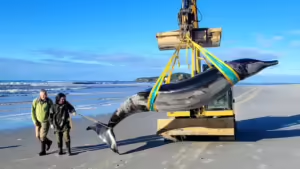Polar exploration rarely gets the Hollywood treatment. Only now are we finally getting a major production of Ernest Shackleton’s 1914-17 expedition, one of the most famous polar journeys of all.
So it’s a bit befuddling that the upcoming movie Antarctica — backed by Searchlight Pictures and Slumdog Millionaire director Danny Boyle — will focus on the controversial 2018 journey of American athlete Colin O’Brady and his “race” against British counterpart Lou Rudd.
Both men wanted to become the first person to complete a solo and unsupported crossing of Antarctica. Ultimately, O’Brady finished first, traveling 1,700km in 54 days. Rudd arrived two days later.
While there’s no doubt the men faced and overcame hellish conditions to complete their quest, several of the foremost living polar explorers have questioned some of the details and the overall importance of their accomplishment.
First, it was hardly a complete crossing of Antarctica, as ExplorersWeb reported in 2019. O’Brady had also spent a significant portion of the trip following a graded and marked road built by the U.S. government in 2005, which should erase the claim of being unsupported, according to polar explorers Mike Horn and Borge Ousland.
In the spring of 2017, Mike Horn completed the longest crossing of Antarctica in history without resupply, spending 57 days alone on the ice, and spanning a staggering 5,100km.
O’Brady on Antarctica’s SPOT road
Asked to comment on O’Brady’s journey by Outdoor Journal, Horn didn’t mince words: “His claim is an insult to Borge Ousland, who did the first traverse in ’96-97, and [it] has no legs to stand on.”
Why does all this matter, you ask? Well, the brief description of Antarctica explicitly says that O’Brady obtained a world record as “the first person ever to cross Antarctica alone, with no support and no assistance.”
In fact, the claims of O’Brady to have made a crossing that was “unsupported and unassisted” inspired a group of Antarctic experts to put together the Polar Expeditions Classification Scheme (PECS). It attempts to define more precisely what terms like “crossing” and “unsupported” should mean in the context of a polar journey.
Of course, it’s fair to say Hollywood has never had a strong interest in historical accuracy. If Danny Boyle makes a compelling film, audiences won’t care about the details.
But admirers of the long, storied history of polar exploration and its many worthy explorers might.






